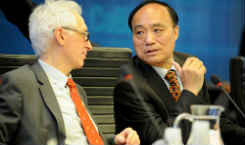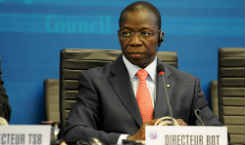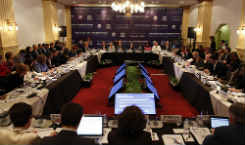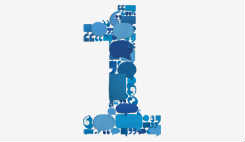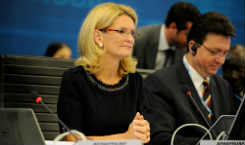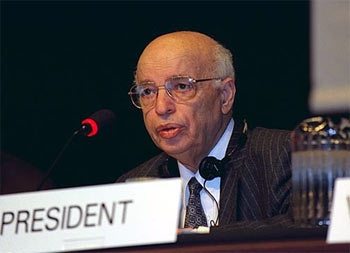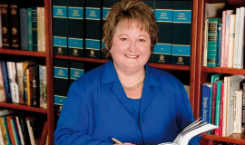

| Next » | ||||||||||||
|
|
||||||||||||
| Issue No. 1 | Geneva, 11 June 2013 | |||||||||||
|
|
||||||||||||
Safe, secure
and affordable
broadband access
|
||||||||||||
State of the Union addressIn his State of the Union address, Dr Hamadoun I. Touré, said that in his seventh year as Secretary-General, he was “pleased to note the excellent bond of trust and the strong working relationships between Council, the Member States and ITU management.”
“The Council gives us a tremendous opportunity to develop a shared vision for the Union,” Dr Touré stated, stressing that ITU’s role is to act as a facilitator and a neutral forum, so that bridges can be built and compromises brokered. “Indeed, ITU will continue to maintain and reinforce its bridge-building role, and leverage our unique position as a place where our members can come together in a neutral setting to discuss the important issues of the day.”
Today, the global challenge is to ensure that all the world’s people have safe, secure and affordable broadband access, and not just the richest third of humanity. Making this observation, Dr Touré said: “It is an extraordinary opportunity for ITU to help make the world a better place for all.” He went on to add: “As the world comes online, we also need to ensure that we meet the fundamental challenge of our generation, which is of course cybersecurity – which means protecting both freedom and privacy. Let me therefore appeal to all our Member States to take the necessary measures to make the online world safe and secure.”
Dr Touré also spoke of the cordial staff-management relations: “In times of economic uncertainty in many regions, increased productivity – enabled by a positive relationship between staff and management – can help to minimize any negative impact on the work of the Union. Given that this requires ever more flexibility and innovation from staff, the positive dialogue between staff and management continues in a very healthy fashion.”
More highlights from the Secretary-General’s State of the Union address are featured under “Major events since the Council last met in July 2012” and “Major events ahead”.
Romania at the helm of Council 2013Marius Cătălin Marinescu, President of Romania’s National Authority for Management and Regulation in Communications (ANCOM), was elected Chairman of this year’s session of the Council, taking over the rotating chairmanship from Region B (Western Europe). Ahmet Cavusoglu (Turkey), outgoing Chairman of Council 2012, highlighted the many achievements during his tenure.
Mr Marinescu called for cooperation in order to live up to today’s challenges. “Industries change, new services arise and the world is transcending from one stage to the other, in years rather than decades.” He told councilors that it is “their role to ensure a better life for the citizens of the world through the means of telecommunications and IT. And that is no small part to play!” He proposed “Cooperation is the key to success” as the slogan for the current Council session.
The vice-chairmanship this year falls to Region D (Africa), and Aboubakar Zourmba from Cameroon was elected to this position.
Caroline Greenway from Australia was elected Chairman of the Standing Committee on Administration and Management, alongside Vice-Chairmen Marcin Krasuski of Poland, who continues to serve in this role from last year, and Vernita Harris from the United States.
A glimpse at the agendaThe Council’s 48 Member States are meeting from 11 to 21 June to examine, among other things, the strategic and financial plans for the Union for the period 2016-2019, the budget for 2014-2015, cybersecurity, international public policy related to the Internet, climate change, ICT accessibility for persons with disabilities, gender mainstreaming, and preparations for upcoming conferences.
Major events since the Council last met in July 2012ITU Connect Americas Summit (Panama City, Panama): This summit built on the successes of ITU Connect Africa in 2007, ITU Connect CIS in 2009, and ITU Connect Arab States in 2012. The private sector and non-governmental stakeholders from 36 countries in the region entered into multi-million dollar partnerships with governments – with identified market opportunities presented to development partners to the tune of over USD 54 billion to fund a wide range of ICT projects, from infrastructure development to emergency communications.
Tenth World Telecommunication/ICT Indicators Meeting (Bangkok, Thailand): The event attracted very high representation from both Telecommunication Regulatory Authorities and National Statistical Offices, who debated issues of data collection and processing coordination. Owing to its appeal and success, participants renamed the event from a Meeting to a Symposium for future editions.
Global Symposium for Regulators (Colombo, Sri Lanka): The theme “Why Regulate in a Networked Society” allowed the 446 regulators, policy-makers and private sector players from more than 70 countries to discuss the evolving regulatory landscape, trends and national spectrum policies, international mobile roaming, net neutrality, data protection, and privacy in the cloud. The Global Regulators-Industry Dialogue (GRID) was a neutral platform for ITU-D Sector Members to share their views on major issues facing the ICT sector.
ITU Telecom World 2012 (Dubai, United Arab Emirates): The event saw critical dialogue, networking and knowledge-sharing at the highest level, with Heads of State and Government, ministers, regulators, industry CEOs, heads of international organizations, consultants, digital thought-leaders and global media. A total of over 230 influential speakers from more than 60 countries took part in over 50 interactive sessions, exploring the challenges and opportunities arising from the current transformation of the ICT industry in terms of business strategy, government policy and technology. Finalists of the second Young Innovators Competition demonstrated their winning ICT-based solutions to real-world developmental issues.
World Telecommunication Standardization Assembly, WTSA-12 (Dubai, United Arab Emirates): A record 102 Member States participated in the four-year event, defined the next period of study for ITU‑T, and called for increased emphasis on e-health, software-defined networking and e-waste. The Assembly saw strong support for ITU-T’s Bridging the Standardization Gap (BSG) programme. Dr Touré invited contributions to the BSG Fund, noting that the “new work we are asked to undertake will be a challenge without increased funding”.
WTSA-12 established a new Review Committee to address major challenges facing the Standardization Sector. “I believe the Review Committee will be crucial in establishing a framework to create more efficient standardization mechanisms to meet the demands of an increasingly converged industry and societal needs – for example in the areas of e-health and climate change,” Dr Touré said.
World Conference on International Telecommunications, WCIT-12 (Dubai, United Arab Emirates): This was a huge event for ITU and its membership. It was attended by 1581 participants and concluded with a treaty in the form of a new set of International Telecommunication Regulations, the ITRs. The new treaty was signed by 89 Member States compared to the 112 countries that signed the 1988 ITRs in Melbourne. Another two Member States have acceded to the treaty. “WCIT-12 was an exemplary instance of an open and transparent multilateral process in which all stakeholders were heard. It is important to note here that we saw more division than ever before at WCIT-12, due to the nature of the matters being discussed – but I am delighted that membership has also seen the importance of building bridges in the tradition of ITU,” Dr Touré commented.
Girls in ICT Day – celebrated the fourth Thursday in April every year: Over 1500 activities were organized in more than 120 countries. ITU celebrated the event in Geneva (on 25 April) and also in Brussels, at the invitation of the European Commission’s DG Connect, and with the personal support of EC Vice-President Neelie Kroes. During a networking lunch at the European Parliament, “Tech Needs Girls” prizes were awarded to ten talented young individuals, including a group of young Nigerian girls, for innovative technology-based projects. At ITU headquarters, the day was celebrated around the theme “Discover, Learn and Share”. Co-organized by ITU and the United States Mission in Geneva, the event welcomed over 70 schoolgirls aged 14 to 17 from local Swiss and French schools, and kicked off with a tour of the ICT Discovery, followed by workshops on satellites, coding, mobile app creation, and digital videography.
WSIS Forum 2013: More than 1800 WSIS stakeholders from over 140 countries attended this year’s Forum, including more than 60 ministers, deputy minsters and ambassadors, along with chief executive officers of companies and civil society leaders. The event was co-organized by ITU, UNDP, UNESCO and UNCTAD, and mainly focused on WSIS Review Process – WSIS+10 – for measuring progress towards targets set in 2005 in Tunis, and around forging a common vision for new actions beyond 2015. This year’s WSIS Forum also saw the United Nations Group on the Information Society (UNGIS), endorse a Joint Statement on the Post 2015 Development Agenda.
Fifth World Telecommunication and ICT Policy Forum (WTPF-13): Over 900 participants from 126 Member States, including over 40 ministers, deputy ministers and ambassadors converged on Geneva, while more than 3000 people participated remotely through webcasting. WTPF-13 endorsed six Opinions in the following areas:
World Telecommunication and Information Society Day (17 May): This year’s theme “ICTs and Improving Road Safety” is in line with the United Nations “Decade of Action for Road Safety”. Dr Touré described how ITU has been leading worldwide efforts in developing state-of-the-art ICT standards for intelligent transport systems and driver safety that use a combination of computers, communications, positioning and automation technologies, including radars on board vehicles so as to avoid collision. He said he was “pleased to note that the allocation of harmonized, globally available frequency ranges for automotive radar applications is on the agenda of WRC-15.”
Three laureates were awarded the ITU World Telecommunication and Information Society Award in recognition of their leadership and dedication towards promoting ICTs as a means of improving road safety: Ueli Maurer, President of the Swiss Confederation; Volkmar Denner, Chairman of the Board of Management of Robert Bosch GmbH; and Jean Todt, President of the International Automobile Federation (FIA).
Formula-1 champion driver, Felipe Massa, was on hand to demonstrate how even professional and very experienced drivers can be affected by distractions.
Broadband Commission for Digital Development: At a meeting in New York, the Commission released the report “The State of Broadband 2012: Achieving Digital Inclusion for All” – its first-ever country-by-country snapshot of the state of broadband deployment worldwide. In March 2013, a meeting of the Commission, hosted in Mexico City by co-Chair Carlos Slim, saw in-depth discussions on roadblocks to faster broadband deployment. The Commission endorsed a new broadband target mandating “gender equality in broadband access by the year 2020”. It also launched a new Working Group on the post-2015 development agenda and the future Sustainable Development Goals. At its meeting in New York in September this year, the Commission will launch its “State of Broadband 2013” report.
Major events aheadGlobal Symposium for Regulators (3-5 July, Warsaw, Poland): This year’s theme is “4th Generation Regulation: Driving Digital Communications Ahead”. Highlights will include the quest for additional wireless spectrum to support future mobile growth, strategies to drive 4G infrastructure investment, digital money, roadblocks to IPv6 implementation, and emerging new revenue models for telecommunication operators.
Global Youth Summit (9 to 11 September, Costa Rica): Over 500 young people aged 18 to 25 from countries around the world, as well 9 to 17 year-old Costa Rican youth are expected to attend the event under the theme “BYND 2015”. The Summit will be a platform for young people to ensure their inclusion in the most important decisions of the 21st century. Its outcomes will include a crowd-sourced, multimedia statement to be presented to Heads of State at the United Nations General Assembly later in September. Dr Touré encouraged all Member States to send a delegation of youth to the event. “It will be a great opportunity to showcase the young talent from your country, and to open them up to new opportunities,” he told councillors.
ITU Connect Asia-Pacific Summit (18 November, Bangkok, Thailand) will reinforce partnerships, create investment opportunities, and ensure financial mechanisms to address the most urgent priorities in the region. It will offer a venue for leaders from the public and private sectors as well as international and regional financing and development agencies to network face-to-face and forge new partnerships for the accelerated roll out of broadband connectivity. With many regional leaders confirmed, ITU expects bold decisions and commitments to be announced at the summit.
ITU Telecom World 2013 (19-22 November, Bangkok, Thailand) will bring together leading representatives of the ICT community from the public and private sectors for debate, knowledge-exchange and networking at the highest level. Recognizing that the ICT sector is undergoing a period of major transition, the overall theme of the event is “Embracing Change in a Digital World”. Debates will focus on the impact of major areas of change including communication and business models, industry value chains, new technologies, and new regulatory and standardization approaches. The show floor will showcase technologies, solutions, investment opportunities and partnership potential from around the world.
Eleventh World Telecommunication/ICT Indicators Symposium (4-6 December, Mexico City): The event will feature an international high-level panel debate on monitoring international development goals, including the MDGs and WSIS. Given the importance of this Symposium, Dr Touré encouraged Member States to participate at ministerial level and Sector Members at CEO level.
ITU's sixth World Telecommunication Development Conference (WTDC-14): This event will take place in Sharm-el-Sheikh, Egypt, from 31 March to 11 April 2014. WTDC-14 will provide a vital forum for the discussion and consideration of the main objectives, priorities, projects and programmes relevant to telecommunication development. It will define the work plan of ITU’s Development Sector for the next four years, and will prepare input for the strategic plan of the Union. Two of the six Regional Preparatory Meetings for WTDC-14 have already taken place – in Moldova for the Commonwealth of Independent States, and in Cambodia for Asia-Pacific – with other meetings scheduled to follow in the coming months for the Americas, Africa, the Arab States and Europe.
WTDC-14 will be held back-to-back with WSIS+10 High-Level Event (also in Sharm-el-Sheikh) to provide the necessary vision and the commitment to ensure that ICTs remain high on the political agenda over the next decade. It will also provide an opportunity to award WSIS Stakeholders with the WSIS Project Prizes in 18 categories, in line with the WSIS Action Lines.
The Host Country Agreement for these events will be signed by ITU and Egypt during a plenary meeting on 14 June.
2012 – A landmark yearA brief video clip highlighting key developments in what was widely acclaimed at the inaugural plenary session as a landmark year in the history of the ITU was a fitting introduction to a report on the organization’s activities and achievements in 2012 and the first two months of 2013.
Focusing on a results-based management approach, the report, presented by ITU Deputy Secretary-General Houlin Zhao, on implementing the strategic plan and activities of the Union for 2012-2013 details the outcomes of several major ITU events that took place during this period that illustrated progress made to date in narrowing the digital divide and providing appropriate standards for ICT hardware and applications worldwide.
Commenting on
the report
outcomes, Dr
Touré said: “We
at the ITU are
more than ever
convinced that
connectivity is
synonymous with
socio-economic
progress.”
Following are the main highlights of the report which was resoundingly approved by the Council: Some of the key developments highlighted in the reportITU pursued activities in areas designated as priorities: cybersecurity, climate change, e-health, ICT accessibility, emergency telecommunications, Internet issues, and the promotion of broadband.
Cybersecurity: Plenary participants took note of ITU’s strengthened role in building confidence and security in the use of ICTs as the organization continues to serve as a unique platform for international cooperation, providing concrete responses to the global issue of growing threats to cybersecurity. The activity report notably highlights the ITU-IMPACT project to improve cooperation at regional and international levels, and to harmonize approaches to respond to cross-border cyberthreats.
Climate change: As the dangers of climate change become increasingly apparent, the plenary took note of on-going ITU activities related to the potential use of ICT in mitigating these threats. The most visible result of these activities has been the reinforcement of ITU´s mandate in this domain. ITU-D is in the process of developing a toolkit on using ICTs in response to climate change and related sustainable development challenges. In addition, it is finalizing a reference publication on e-waste management to provide specific guidelines based on case studies. ITU is also providing support to developing countries in their efforts to mitigate and adapt to climate change, including developing early warning systems for natural disasters.
E-health: Another landmark event in 2012 was the publication of the ITU-WHO “National E-Health Strategy Toolkit” – an expert, practical guide that provides governments and other stakeholders with a solid foundation and method for the development and implementation of a national e-health vision, and an action plan and monitoring framework. The toolkit represents one of the most significant ITU-WHO projects in recent years and is a major contribution to promoting health care. ITU-WHO have also launched a new partnership on the use of mobile technology (mHealth) to improve the prevention, treatment and policy enforcement of non-communicable diseases such as cancer, heart disease, strokes, lung disease and diabetes that are the leading causes of death worldwide. ITU is also pursuing technical work to standardize multimedia systems and capabilities for e-health applications.
Outstanding Internet issues: In 2012, to ensure the effective implementation of all relevant Internet-related resolutions, the Secretary-General and other senior ITU officials received regular strategic briefings to enable ITU to continue to play a significant role in international discussions and initiatives concerning the Internet. ITU activities included attendance at and participation in Internet-related meetings, forums and conferences, and tracking emerging trends in the rapidly evolving ICT sector, allowing ITU to adjust its work programme to meet the Union’s strategic goals.
Council adopts inclusion Policy for Persons with Disabilities – A historic moment for ITUIn a landmark decision, the Council endorsed an ITU Accessibility Policy for Persons with Disabilities ensuring reasonable accommodation to ITU services. The policy is contained in an annex to Document C13/42, presented by Doreen Bogdan-Martin, Chief of ITU’s Strategic Planning and Membership Department.
The ITU Secretary-General praised the endorsement as a “historic moment that we can be proud of”. The policy builds on lessons learned from offering ITU services to persons with disabilities at meetings such as WSIS Forum 2011 and 2012, WTSA-12 and WCIT-12. It also draws on the experiences and best practices of other United Nations agencies, international organizations and national administrations. ITU’s mandate in this domain was reinforced during 2012 with the inclusion of a new Article covering ICT accessibility (Article 8B) in the revised ITRs and the approval by WTSA-12 of Resolution 70, “Telecommunication/ICT accessibility for persons with disabilities”.
The new policy represents the first document of its kind produced by an agency of the United Nations System.
Dr Touré recalled that in 2008, ITU celebrated World Telecommunication and Information Society Day under the theme “Connecting Persons with Disabilities: ICT opportunities for all.” And Andrea Saks, who has been key in the creation of accessibility events at ITU, was a winner of the World Telecommunication and Information Society Award that year. Ms Saks is the convener of the Joint Coordination Activity on Accessibility and Human Factors (JCA-AHF). “Andrea was our hero then, and is our hero now,” Dr Touré said.
Those who spoke on the new policy observed that all too often, people with disabilities find themselves marginalized and unable to afford the technologies that could change their lives. We must all play our part in ensuring that ICT are made accessible and affordable to people with disabilities, to enable them contribute more to society.
WSIS mattersFollowing a
lively debate on
the future role
of ITU in the
WSIS+10
preparatory
process, the
Council decided
to create a
drafting group
to revise
Resolution 1334
on ITU’s Role in
the Overall
Review of the
Implementation
of the WSIS
Outcomes.The
revision will be
based on the
proposals put
forward by the
Council Working
Group on the
World Summit on
the Information
Society
(WG-WSIS) in its
report (Document
C13/66);
proposals from
the Russian
Federation on
ways to prepare
for the WSIS+10
High-Level Event
in 2014 and from
Poland on WSIS
indicators.
Poland
specifically
proposes the
establishment of
a global
measurement
observatory - a
mechanism which
will allow the
gathering and
publishing of
information on
the realization
of WSIS Action
Lines by each
Member State
annually. The
drafting group
is chaired by
Professor
Vladimir Minkin,
who is also the
Chairman of
WG-WSIS, and
will report back
to the plenary
after it meets
on 12 June. Council calls for case studies on remote participationITU was instructed by the Plenipotentiary Conference to develop an action plan, to be considered by the Council, for electronic participation in its working groups and related meetings that report to the Council, including the use of tools such as videoconferencing. Following presentation of a status report on “Strengthening ITU capabilities for electronic meetings and means to advance the work of the Union” by Anders Norsker, Chief of the ITU Information Services Department, more than 20 countries commended ITU for its efforts in piloting remote participation services. But they also had some questions. Is remote participation mature and reliable enough to be institutionalized in all ITU meetings? Is it cost effective? What would be the impact on the rules and procedures?
For some, an analysis should be carried out to determine the extent to which this remote participation can be pursued. Others stressed that remote participation cannot replace face-to-face meetings: for example coffee breaks allow delegations to negotiate and reach consensus. Also, use of remote participation could have implications on rules of procedure of the Council or other ITU organs. It was suggested that a distinction should be drawn between treaty and non-treaty conferences. The need to ensure that developing countries are technically ready was also stressed, as was the need to undertake case studies.
In briefMinute of silence: The Council observed a minute of silence in tribute to the memory of some of ITU’s longest-serving supporters: Abderrazak Berrada, former Member and Chairman of the International Frequency Registration Board (IFRB); Steve Bond, a respected colleague for all in ITU-R; Warren Richards, a well-known and respected figure in international telecommunications policy; and Filiberto Au Kim, a renowned Cuban radiocommunications engineer, who took part in many world radiocommunication conferences.
Remembering Cynthia Waddell: Special tribute was also paid to Dr Waddell, a lifelong advocate for the rights of people with disabilities, and an expert in disability rights law, public policy and electronic and information technology.
The need to revive the Council Working Group on Languages: During the discussion on the report on implementing the strategic plan and activities of the Union for 2012-2013, Egypt, backed by Saudi Arabia, underlined the importance of, and need to revive, the work of this group by appointing a new Chairman, following the passing of Nabil Kisrawi in 2011. Mr Zhao informed the Council that consultations were under way.
Not an official document – For information only. |
|
|||||||||||


